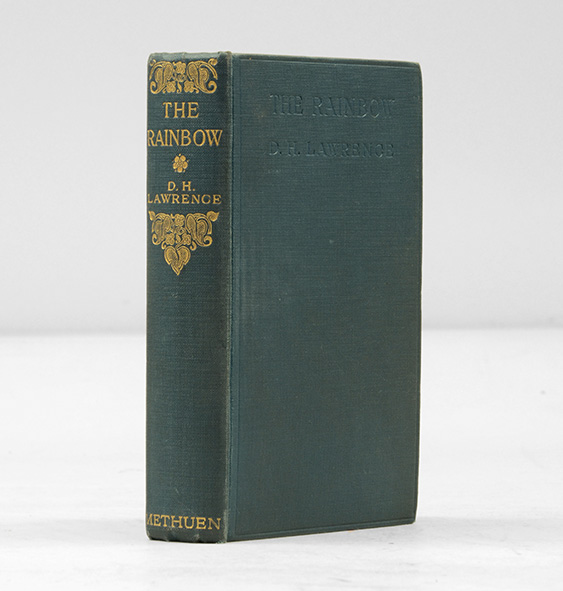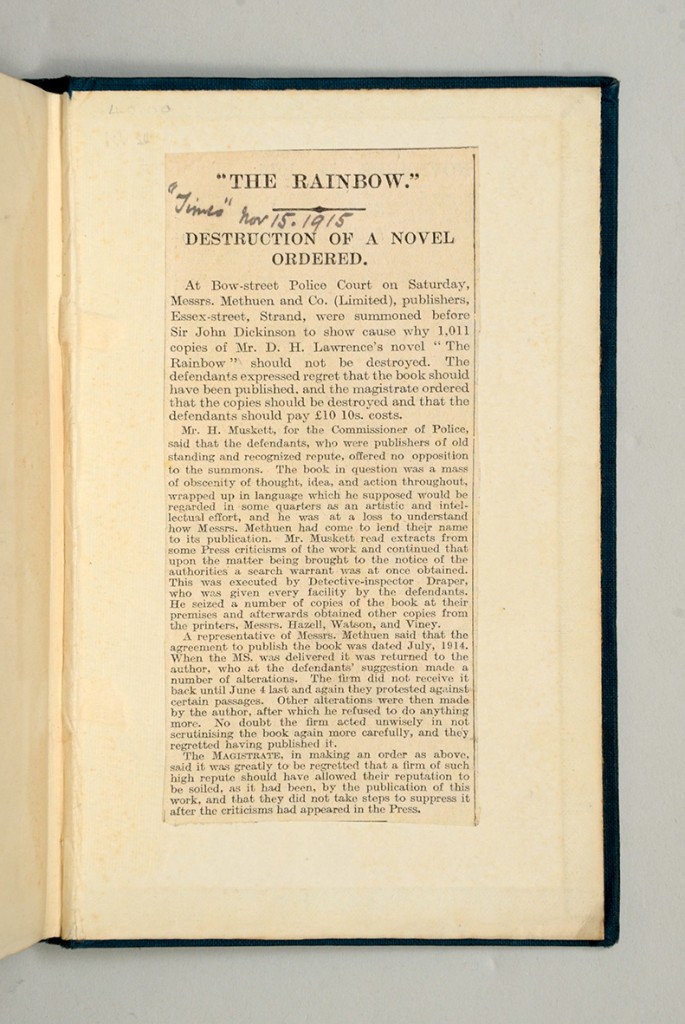
Rare first edition of The Rainbow by D. H. Lawrence, 1915.
The story of the 1960 trial of Lady Chatterly’s Lover, D. H. Lawrence’s 1928 novel of sexual awakening, is well known. But fewer are aware of the circumstances surrounding one of the author’s earlier books, The Rainbow, which was nearly as controversial as its successor.
Methuen published The Rainbow in September 1915, but quickly withdrew it from sale in the face of almost universally hostile reviews and impending prosecution. “Its religious language, emotional and sexual explorations of experience, and sheer length had given its readers problems, but it was Ursula’s lesbian encounter with a schoolteacher in the chapter ‘Shame’ which had finally condemned it in the eyes of the law and of a country now focused on conflict” (ODNB). At Bow Street magistrates’ court on November 13 it was banned as obscene, with the result that half of the print run of 1250 copies was destroyed.
One of the copies that survived is the one depicted above, which we recently acquired (BOOK SOLD). What makes this copy evocative of the time and circumstances is that the original owner cut from the Times an account of the book’s suppression and pasted it on to the inside of the rear cover, as if to say, “This copy and I are part of this”:

Newspaper account of the suppression of D. H. Lawrence’s The Rainbow, pasted into the back of a first edition.
As an account of the attempted destructed of ideas the report dire, and the circumstances almost destroyed Lawrence’s writing career. But, given the end result for his novels and literary reputation, I think we can allow ourselves a little chuckle at the authorities’ expense. Here’s the complete text of the piece:
At Bow-street Police Court on Saturday, Messrs. Methuen and Co. (Limited), publishers, Essex-street, Strand, were summoned before Sir John Dickinson to cause why 1,011 copies of Mr. D. H. Lawrence’s novel “The Rainbow” should not be destroyed. The defendants expressed regret that the book should have been published, and the magistrate ordered that the copies should be destroyed and that the defendants should pay £10 10s. costs.
Mr. H. Muskett, for the Commissioner of Police, said that the defendants, who were publishers of old standing and recognized repute, offered no opposition to the summons. The book in question was a mass of obscenity of thought, ideas, and action throughout, wrapped up in language which he supposed would be regarded in some quarters as an artistic and intellectual effort, and he was at a loss to understand how Messrs. Methuen had come to lend their name to its publication. Mr. Muskett read extracts from some Press criticisms of the work and continued that upon the matter being brought to the notice of the authorities a search warrant was at once obtained. This was executed by Detective-inspector Draper, who was given every facility by the defendants. He seized a number of copies of the book at their premises and afterwards obtained other copies from the printers, Messrs. Hazell, Watson, and Viney.
A representative of Messr.s methuen said that the agreement to publish the book was dated July, 1914. When the MS. was delivered it was returned to the author, who at the defendant’s suggestion mad ea number of alterations. The firm did not receive it back until June 4 last and again they protested against certain passages. Other alterations were then made by the author, after which he refused to do anything more. No doubt the firm acted unwisely in not scrutinising the book again more carefully, and they regretted having published it.
The Magistrate, in making an order as above, said it was greatly to be regretted that a firm of such high repute should have allowed their reputation to be soiled, as it had been, but the publication of this work, and that they did not take steps to suppress it after the criticisms had appeared in the Press.
Follow this link for our complete selection of rare books by D. H. Lawrence.
-----------------

No hay comentarios:
Publicar un comentario
Comentate algo, no seas amarrrrgo... y si comentás, no nos amargués :D